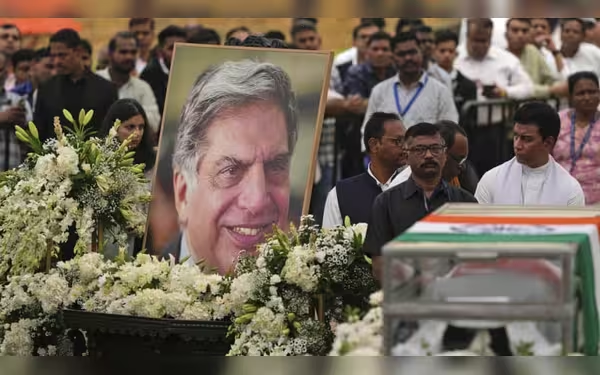Saturday, November 16, 2024 05:42 PM
Ratan Tata's Vision for India's Economic Future
- Ratan Tata transformed Tata Group into a global powerhouse.
- India's economy faces challenges in job creation.
- Tata Group supports government's self-reliance initiatives.
 Image Credits: channelnewsasia
Image Credits: channelnewsasiaRatan Tata's legacy inspires India's economic growth, balancing services and manufacturing for a stable future.
In India, the Tata name is synonymous with progress and innovation. From the tea that kickstarts the day to the buses that transport millions, the Tata brand is woven into the very fabric of Indian life. This week, the nation mourns the loss of Ratan Tata, the visionary leader who guided the Tata Group through transformative years. His journey reflects not only the growth of a conglomerate but also the evolution of India itself, from a nascent industrial economy to a global player.
Ratan Tata took the helm of the Tata Group in 1990, just as India was on the brink of significant economic reforms. Under his leadership, the company diversified from its traditional roots in steel and chemicals to embrace the burgeoning fields of small cars and information technology. This shift mirrored India's own transition from a state-controlled economy to one driven by consumer demand and service exports. Today, Tata Consultancy Services stands as a testament to this evolution, representing the largest share of the group's value.
However, the broader narrative of India's economy tells a different story. While the services sector has flourished, the country has faced challenges with job creation and economic security. The current government, led by Prime Minister Narendra Modi, is striving to revive the manufacturing sector through ambitious industrial policies. Yet, the task is daunting. Efforts to enhance productivity have often been overshadowed by a focus on tariffs and subsidies, which may not yield the desired results.
In a recent commitment to the Prime Minister, N Chandrashekharan, the CEO of Tata Sons, expressed confidence in the Tata Group's ability to innovate. He stated, "Tata Group will now be able to take aluminium ingots at one end of the value stream and turn it into an Airbus C295 aircraft for the Indian Air Force at the other." This ambitious project, along with the establishment of semiconductor fabrication factories, highlights the Tata Group's role in supporting the government's push for self-reliance.
As India navigates its economic landscape, the legacy of Ratan Tata serves as a guiding light. His vision for a modern, competitive India remains relevant today. The challenge lies in balancing the growth of the services sector with a robust manufacturing base that can provide jobs and economic stability. The future of India's economy may depend on how well it can integrate these two worlds, ensuring that the dreams of millions are not just aspirations but achievable realities.













